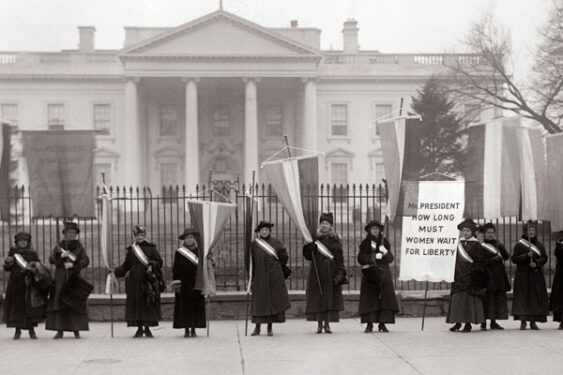
WINDSOR TERRACE — Even though some would claim the Church has not always been progressive when it comes to women’s rights, a look back at clippings from The Tablet might suggest something different.
In its editorials, The Tablet supported the legislation that gave women the right to vote 100 years ago, and on Aug. 18, 1920, the 19th Amendment to the Constitution was finally ratified.
“In a day when the education of the sexes is equal, it becomes a republic to rely on its female as well as its male subjects for interest in the common good,” wrote The Tablet in an editorial in its Oct. 2, 1920 edition as Election Day approached.
“There is no defendable reason under the sky why the talent of cultured women and the native conservatism of all women should not be enrolled for the promotion of general progress.”
The Tablet pointed out that it had not always been so.
“Men who stood boldly and fearlessly against the movement for equal suffrage, men of foresight and ability like our beloved Cardinal Gibbons are now one in urging all women of the proper qualifications to employ their new-found honor for the welfare of the nation and the safeguarding of the rights of their sex,” wrote the anonymous editorialist. The reference to Cardinal James Gibbons of Baltimore was well documented.
In the Dec. 16, 1916 issue of The Tablet, the prelate spoke in Washington D.C. to the National Association Opposed to Woman’s Suffrage saying, “I still hold the same views on woman suffrage, already so often expressed: that the ballot would drag a woman from her domestic duties into the arena of politics, and rob her of much of her charm, goodness, and true influence … I regard ‘woman’s rights’ women and the leaders of the new school of female progress, as the worst enemy of the female sex.”
The Tablet editorial continues: “It is old-fashioned and unbecoming to Catholics and non-Catholics alike to maintain that our women are not to indulge in any action which their mothers before them did not use.”
The piece urged Catholic women to register for the vote and turn out at the polls in large numbers.
It said that denying women the vote was a continuation of prejudices that existed from before the Civil War and that “have been ironed out of the history of the country.”
About one month later, Tablet Managing Editor Patrick F. Scanlan commented on the anti-Catholic tactics used by some during the recent campaign as disgusting and disheartening.
He added dismay that the addition of women to the voting roles seemed to have made little difference to partisan anti-Catholic politics.
“Many of us thought that once the women obtained the franchise, politics would become cleaner, and the rotten ricks of the men would be supplanted by the respectable traits of the women.
Unfortunately, this was not so in the recent campaign,” wrote Scanlan, who joined The Tablet staff in 1917 and remained in place until 1968.
“The more intelligent and the more respectable ladies will have to sacrifice a little of the time they devote to their homes, will have to cast aside some of their well-known dignity, and let the bold and brazen minority — who have little conception of the rights or duties of womanhood — realize that they cannot cast odium on the sex, at least without a battle.”
Scanlan was already on record as supporting the woman vote issue. In a May 25, 1918 column, he wrote, “Let our Catholic women go to the polls and bring with them that purity, that charity, that nobleness of character that is part and parcel of themselves. Let them bring the democracy of the fireside, the republicanism of the home there. Let them bring those Catholic principles which they have learned at the altar, brought into their hearts, and practiced in their homes. Let them as practical Catholics, true Americans, and good citizens vote.”
As early as 1913, The Tablet pointed out that there was no official Church position on the women’s vote issue.
Various bishops around the world had taken different positions but the Holy See had not spoken on the subject.
On April 24, 1915, Tablet Editor Father John I. Whalen proclaimed, “Suffrage is coming. That sounds like a prophecy. We think that the prophecy will come true. But if Suffrage is coming, it behooves women, especially Catholic women, to prepare themselves for the faithful discharge of a new duty. To our mind, that is the most important thing touching on Suffrage.”
He said that the impression that the Church was opposed to Suffrage was not accurate.
A Tablet editorial, Oct. 2, 1919, stated, “There was some difference of opinion — even among good Catholics — as to the expediency of giving votes to women. But in the mind of any well-instructed and judicious Catholic, there should be no question whatsoever of the duty and responsibility of women to whom the vote has been given by law.
“The franchise is not only a privilege and an opportunity, it is likewise a responsibility and a conscientious trust. The sooner and the more thoroughly our Catholic women come to realize the burden that has been laid upon them, the better it will be for the Church and for the Nation.
“The Catholic women have the immense advantage of being guided in the most important issues by the principles of the Church, and of having the course charted for them where less fortunate women are utterly at sea. In questions that concern public morals, social justice, the opposing of false principles, the interests of the weak and friendless, the cause of religion, the Catholic viewpoint is fixed and clear and no one needs deliberate which way to look for patriotism and true public spirit.”
[Related: Recognizing the Role Black Women Played in the Movement]
